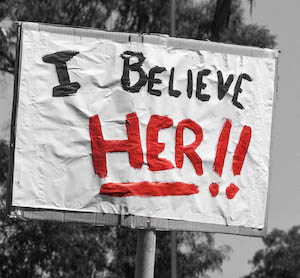Gender politics
Grace Tame and Brittany Higgins at the Press Club
In their Press Club addresses Grace Tame and Brittany Higgins spoke about people in power who abuse people without power. Higgins’ address was mainly about women’s experiences in the workplace while Tame’s was mainly about sexual abuse of boys and girls.

The media has focused on the criticism they levelled against Morrison – an easy picking for journalists – but their main point in that criticism is about someone who just didn’t get it, someone with sympathy but no empathy or a sense of what should be done. “I didn’t want his sympathy as a father. I wanted him to use his power as prime minister” said Higgins.
Both Tame and Higgins criticized the whole way the Morrison government has handled the problem of abuse against women and children, as one to be responded to with a press release, a commissioned inquiry, announcement of a few bits of loose change for some token programs ($X million over four years, where X is a single small digit), a statement, perhaps even an apology – rather than any substantive action to deal with the problem. In this context Higgins mentioned the draft National Plan to End Violence Against Women and Children as a document with lofty statements but weak in anything that may qualify as a “plan”.
This has been a pattern of the Morrison government across almost all areas of public policy. It would be an easy pattern for the next government to fall into. It’s a process with which journalists are comfortable when they are fed words they can cut and paste, without the need for the hard work of critical analysis.
In their own ways both Tame and Higgins have projected their messages by breaking unwritten rules – rules that suppress those with public prominence from actually using their voice, particularly if they’re women. Commenting on her own situation as Australian of the Year Tame asked “What is the point of awarding someone for their work only to stifle them when they do it? … To retreat into silence now would be hypocritical.” She went on to say “I would rather go down as a disappointment to an institution than sell out as a pandering political puppet to the corrupt forces that coercively control it.”
A questioner from Sky News asked both speakers if their disapproval of Morrison meant that they supported Albanese and the Labor Party – typical of journalists’ assumption that there are only two political choices, and typical of the Murdoch media’s attempt to label any critic of the Coalition as a Labor Party stooge. She asked if there is anything that they think Albanese would do better than Morrison. Tame’s response:
All Anthony would have to do is none of the things that Scott’s done.
Almost at the very end, in response to a question by Karen Barlow of the Canberra Times, Higgins described her experience as an adviser working at Parliament House. She was shocked at the influence exercised by young and inexperienced members of political staff, and by the way the public service has been sidelined. She tells a story not only of bullying and sexual assault, but also of a corrupted and dangerous governance structure.
On a related theme, as widely reported in the media, Tame recounted how a senior person on the public payroll made a threatening phone call, pressuring her not to criticize the prime minister (not even a sideways glance). The prime minister denied any personal involvement: he needn’t have bothered, because most senior public servants, in contempt of parliament and of their duty to serve the public, anticipate and act on ministers’ political interests without being directed. Together Higgins and Tame described a marginalized and politicized public service.
Authoritarians live in fear of powerful women
In her address to the Press Club (see the previous section) Grace Tame reported that a caller from the government wanted her not to say anything damning about the prime minister because Morrison was afraid of her.
Her experience aligns with what Erica Chenoweth and Zoe Marks of Harvard’s Kennedy School describe in a Foreign Affairs article Revenge of the patriarchs: why autocrats fear women.
They mention Napoléon Bonaparte and Benito Mussolini. In our times there have been Vladimir Putin, Donald Trump, Abdel Fateh el-Sisi, Recep Tayyip Erdoğan, Xi Jinping and Jair Bolsonaro. The wave of authoritarianism that has swept over the world in this century has also been a wave of patriarchal misogyny.
The most prominent examples of oppression of women are in countries such as Saudi Arabia and Afghanistan, but there is also an anti-women culture war waged by governments in democracies. “One way that autocratic and illiberal leaders make a gender hierarchy palatable to women is by politicizing the ‘traditional family’, which becomes a euphemism for tying women’s value and worth to childbearing, parenting, and homemaking in a nuclear household – and rolling back their claims to public power.” Wittingly or unwittingly, conservative women “often play supporting roles to the masculine stars of the show”.
While Chenoweth and Marks write of the need for women to mobilize against political and institutional misogyny, they don’t see such movements in the frame of a war of the sexes, as many conservatives suggest. Rather, those regimes where women have achieved power in the public realm tend to be better places for women and for men.
Aspiring autocrats and patriarchal authoritarians have good reason to fear women’s political participation: when women participate in mass movements, those movements are both more likely to succeed and more likely to lead to more egalitarian democracy.